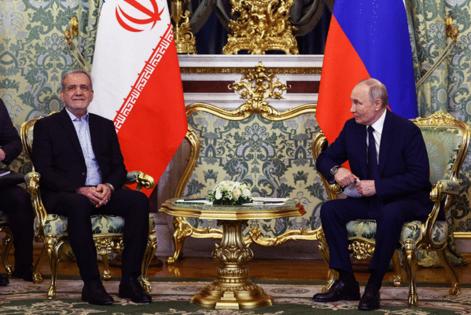Russia and Iran draw closer with new pact before Trump returns
Published in News & Features
Russian President Vladimir Putin and his Iranian counterpart, Masoud Pezeshkian signed a new strategic cooperation pact as the two countries brace for the return of U.S. President-elect Donald Trump to the White House.
The comprehensive strategic partnership agreement inked at a Kremlin ceremony on Friday seeks to deepen political and economic ties between Russia and Iran as they grapple with sanctions imposed by the U.S. and its allies.
“It’s important because it allows us to add fresh momentum practically to the whole range of our cooperation,” Putin said in televised comments at the start of the meeting. He described the accord as a “breakthrough” in relations at a joint press conference with Pezeshkian after the summit.
“Today’s agreement has opened a new era in the relationship between Iran and Russia,” Pezeshkian said.
With Iran facing a domestic energy crisis and unable to meet record levels of demand for natural gas and electricity, Putin held out the prospect of energy from Russia, though he offered no timetable.
Russia could supply gas to Iran with exports starting at 2 billion cubic meters per year and rising to as much as 55 billion cubic meters in the future, Putin said, when asked about the progress of a gas pipeline project to the Islamic Republic. Still, “many questions, including on price parameters,” need to be resolved, he said.
Russia and Iran have drawn closer since Putin’s full-scale invasion of Ukraine in 2022 triggered sweeping sanctions and Moscow’s most serious confrontation with the West since the Cold War. Russia is building a trade route with Tehran connecting to India to try to weaken the impact of sanctions, and officials have discussed boosting financial and banking cooperation as Moscow seeks to learn from Tehran’s experience of decades in isolation.
“Russia was previously cautious about describing ties with Iran as ‘strategic’ to avoid antagonizing key regional players like Saudi Arabia, Israel, the UAE, and even the West,” said Nicole Grajewski, who focuses on Russia and Iran as a fellow in the Nuclear Policy Program at the Carnegie Endowment for International Peace. Now, “Russia is reliant on Iran for its war,” she said.
Trump, who takes office on Monday, has vowed to bring a swift end to the war in Ukraine, though it’s unclear how he’ll achieve a settlement between Moscow and Kyiv. His pick for national security adviser has threatened a return to the “maximum pressure” policy toward Iran that Trump adopted in his first term as president. Still, Trump has also suggested he wants to stabilize the relationship with Tehran.
The treaty will formalize commitments to closer defense cooperation with Iran, according to Russian Foreign Minister Sergei Lavrov. There isn’t a mutual-defense clause of the kind included in Russia’s recent accord with North Korea, Iran’s ambassador to Moscow, Kazem Jalali, told the state-run Tass news service on Thursday.
Russia and Iran agreed not to provide military or other assistance to any state that acted as an aggressor toward the other, according to the text of the treaty published on the Kremlin’s website.
Iran has supplied Russia with hundreds of attack drones since the start of the war that have been used to strike Ukraine, and has also sent ballistic missiles to aid Putin, according to the U.S. and European nations. Tehran denies shipping weapons to Russia.
Iran is seeking Russia’s S-400 advanced air-defense system to try to better protect assets including its nuclear facilities against attack. It’s also asking Russia to provide Sukhoi Su-35 fighter jets to help transform an aging Iranian air force that’s been sanctioned for decades.
The two countries are “in the same trench in the fight against the West,” said Nikolay Kozhanov, a former Russian diplomat in Iran who’s now an associate professor at Qatar University’s Gulf Studies Center. “It is not the treaty itself that is important, but the timing. Putin and Pezeshkian need to understand how they can stand up to Trump.”
----------
With assistance from Golnar Motevalli and Patrick Sykes.
©2025 Bloomberg L.P. Visit bloomberg.com. Distributed by Tribune Content Agency, LLC.







Comments